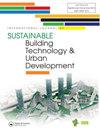可持续发展的盲点:建筑
Q4 Engineering
International Journal of Sustainable Building Technology and Urban Development
Pub Date : 2016-11-07
DOI:10.1080/2093761X.2016.1237397
引用次数: 0
摘要
摘要:建筑行业现在已经达到了许多可持续发展规范和实践已经被引入和执行的阶段,试图减少与建筑环境相关的碳排放。虽然这些努力已经成功地使该行业转向更可持续的做法,但在减少该行业的总能源消耗和碳排放方面取得的成功有限。本文讨论了建筑的预期目的如何导致这种不足,以及它如何阻碍新兴建筑技术的潜在环境效益。有人认为,如果建筑设计的基本方式保持不变,那么很可能减少碳排放的目标将无法实现,而这些排放将会增加。本文还提供了如何缓解这些缺点的见解,以确保未来的建筑环境是使用真正可持续的概念创建的。本文章由计算机程序翻译,如有差异,请以英文原文为准。
Blind spots of sustainability: architecture
AbstractThe building sector has now reached the stage where numerous sustainability codes and practices have been introduced and enforced in an attempt to reduce carbon emissions associated with the built environment. While these efforts have been successful in shifting the industry towards more sustainable practices, they have had limited success in reducing the sector’s total energy consumption and carbon emissions. This paper discusses how the intended purpose of architecture has contributed to this shortfall, and how it has obstructed the potential environmental benefits of emerging building technologies. It is argued that if the fundamental way in which buildings are designed remains unchanged then it is likely that the targets for reducing carbon emissions will not be met, and that an increase in these emissions will occur. The paper also provides insights into how these shortcomings might be mitigated to ensure that future built environments are created and created using truly sustainable concepts ...
求助全文
通过发布文献求助,成功后即可免费获取论文全文。
去求助
来源期刊

International Journal of Sustainable Building Technology and Urban Development
Engineering-Building and Construction
CiteScore
1.20
自引率
0.00%
发文量
0
期刊介绍:
The International Journal of Sustainable Building Technology and Urban Development is the official publication of the Sustainable Building Research Center and serves as a resource to professionals and academics within the architecture and sustainability community. The International Journal of Sustainable Building Technology and Urban Development aims to support its academic community by disseminating studies on sustainable building technology, focusing on issues related to sustainable approaches in the construction industry to reduce waste and mass consumption, integration of advanced architectural technologies and environmentalism, sustainable building maintenance, life cycle cost (LCC), social issues, education and public policies relating to urban development and architecture .
 求助内容:
求助内容: 应助结果提醒方式:
应助结果提醒方式:


